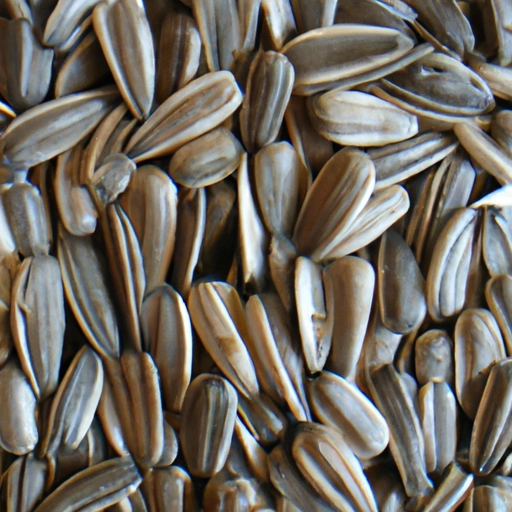Sunflower Seed
Description

Sunflower seeds are the fruits of the sunflower plant, Helianthus annuus. These small, teardrop-shaped seeds boast a mild, nutty flavor and a firm but tender texture, making them a versatile ingredient in a variety of culinary applications. Sunflower seeds can be consumed raw, roasted, or used as an ingredient in cooking and baking. They are commonly available shelled, with their black-and-white striped hulls removed to reveal the edible kernel inside, or unshelled. With their rich nutrient profile and widespread availability, sunflower seeds are enjoyed across the globe.
Common uses
Sunflower seeds are commonly used as a snack, either eaten on their own or mixed into trail mixes. They are also sprinkled on salads, blended into smoothies, and incorporated into granola bars. Beyond snacking, sunflower seeds are a popular addition to bread and other baked goods, lending their crunchy texture and wholesome flavor to the recipes. They can be ground into a meal or butter, similar to almond or peanut butter, and are used as a topping for yogurt, oatmeal, and cereal.
Nutritional value
Calories
A 1 ounce (28 grams or roughly 3 tablespoons) serving of shelled sunflower seeds contains approximately 163 calories.
Protein
This same serving size provides about 5.5 grams of protein, making sunflower seeds a good plant-based protein source.
Fat
Sunflower seeds are rich in healthy fats, with a serving containing about 14 grams, predominantly polyunsaturated and monounsaturated fats.
Carbohydrates
The carbohydrate content of sunflower seeds is about 6.5 grams per ounce, which includes dietary fiber and some natural sugars.
Vitamins
These seeds are a good source of Vitamin E, Vitamin B1 (thiamin), and Vitamin B6 (pyridoxine).
Minerals
Minerals found in sunflower seeds include magnesium, phosphorus, selenium, and iron.
Health benefits
Sunflower seeds offer several health benefits due to their rich nutrient profile. They contain antioxidants, which help fight free radicals and may reduce the risk of certain chronic diseases. The Vitamin E content supports skin health and acts as an anti-inflammatory. Their high magnesium levels may contribute to bone health and help manage blood pressure, while the presence of selenium plays a role in thyroid function. The fiber in sunflower seeds aids in digestion and can help in maintaining a healthy weight.
Potential risks
While sunflower seeds are healthy in moderation, they are high in calories and can contribute to weight gain if consumed in large quantities. Additionally, some packaged sunflower seeds may be high in added salt, which can increase the risk of high blood pressure. As with any food, there's also the potential for allergies, and individuals allergic to sunflower seeds should avoid them.
Common recipes
Sunflower seeds are used in a variety of recipes, from multigrain bread and muffins to pesto and vegetarian burgers. They're also a staple in energy bites and homemade granola.
Cooking methods
These seeds can be dry-roasted, toasted in the oven, or pan-fried to enhance their flavor. They can also be soaked or sprouted to add to salads and sandwiches.
Pairing with other ingredients
Sunflower seeds pair well with fruits, such as berries and apples, as well as with vegetables like spinach and kale. They complement grains like quinoa and rice and can be mixed with other nuts and seeds for added texture and nutrition.
Summary
Sunflower seeds are a healthful and flavorful addition to a diverse array of dishes. With their historical roots in North America and widespread adoption across the world, they offer an impressive nutritional profile that includes proteins, healthy fats, and important vitamins and minerals. Whether sprinkled on top of a dish for a crunchy texture or incorporated into recipes for their distinct taste, sunflower seeds are a valuable ingredient cherished globally.